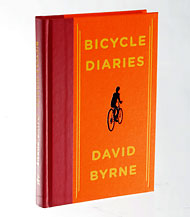|
Pedaling his musings about life, music, art, community
By Steven Rea, The Philadelphia Inquirer, 20 September 2009 [Link]
 For David Byrne, "Mr. Psycho Killer" and ex-Talking Head, visual artist, and man-about-the-globe, riding a bike—which he has been doing habitually since the early 1980s—is more than a means for commuting and exploring. It's a form of meditation. For David Byrne, "Mr. Psycho Killer" and ex-Talking Head, visual artist, and man-about-the-globe, riding a bike—which he has been doing habitually since the early 1980s—is more than a means for commuting and exploring. It's a form of meditation.
Perched atop his bicycle, pedaling through the streets of New York (where he lives), or Berlin, Detroit, London, Melbourne, Tokyo, "facilitates a state of mind that allows some but not too much of the unconscious to bubble up," he writes in the introduction to his engaging, illuminating Bicycle Diaries.
"As someone who believes that much of the source of his work and creativity is to be gleaned from those bubbles, [cycling is] a reliable place to find that connection. In the same way that perplexing problems sometimes get resolved in one's sleep, when the conscious mind is distracted, the unconscious works things out."
And so Bicycle Diaries—a collection of musings about art and music, about urban ecology, history, social behavior, and politics—is Byrne working things out. Taking his inspiration from W.G. Sebald's The Rings of Saturn (English country rambles lead to ruminations big and small) and Caetano Veloso's Tropical Truth (Brazil's "Tropicália" years as a springboard for the author's tangential thoughts and memories), Byrne describes his peregrinations atop his folding mountain bike: the hills of San Francisco, the rides along the Bosphorus in Istanbul, the parks of Buenos Aires (one of his favorite cities).
But while there are some very nice travel-writing moments (a swarm of bats during an outdoor opera in Sydney's Domain Park; the plethora of karaoke machines on the streets of Binondo, Manila's old city center), mostly Byrne's two-wheeling journal entries lead him to deeper contemplations.
Of course, there are Byrne's passionate takes on various musical genres. A huge Latin-music aficionado (and performer), Byrne talks about the joy of playing salsa and cumbia, the "biological metaphor" of moving your body to the syncopated rhythms of funk, Latin, hip-hop.
There are fleeting reminiscences of his street-busking days in Berkeley, and an amusing scene when a cabbie who recognizes Byrne tells him he knows where his former Talking Heads bandmate Jerry Harrison lives. Why not stop by and say hello?, the driver suggests. (Byrne's not interested.) [The passage reads: "He recognizes me and tells me he knows that the lead guitarist from Talking Heads lives in Marin (he means Jerry Harrison). He also knows where Dana Carvey lives, so he proceeds to try
to convince me to get together with Dana and start a club.” —ed.]
More surprising—at least for folks who haven't been keeping up with Byrne's blog these past years—are the musician and artist's reflections on urban ecology, his disdain for Le Corbusier and the International Style, his keen sense of how a city does—and doesn't—encourage community, commingling, creativity.
In one succinct paragraph, Byrne—who grew up on the outskirts of Baltimore—sums up the seismic shift in America in the 1950s away from city living to a new life in suburbia. Later, he extols the wisdom of city planners such as Jane Jacobs and Jan Gehl; praises the former mayor of Bogotá, Enrique Penalosa, who brought foot traffic and cycling back to a city overrun with cars; and New York City's current, bike-friendly transportation chief, Janette Sadik-Khan.
Byrne is a cycling advocate, to be sure (he designed a series of whimsical but functional bike racks for New York's sidewalks), and sometimes his ardor gets the better of him. He's as guilty of stereotyping, of making snap judgments, as the rest of us. But he usually catches himself, and chastises himself, for doing so—self-deprecatingly.
Still, whether you're a cyclist or not, Byrne's insights into everything from outsider art to aboriginal folk lore, from R. Kelly's "Trapped in the Closet" to Imelda Marcos' legendary closets of shoes, are wry, witty, and, more often than not, wise as well.
Steven Rea is an Inquirer movie critic and avid bicyclist.
|

